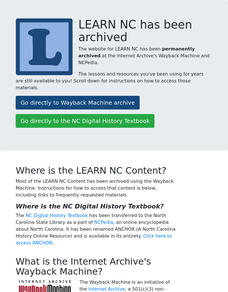Curated OER
How Big is the Sun? Exploring the Size and Scale of the Sun, Earth and Moon
Students explore the relative sizes of the Sun, Earth and Moon as they make an impressive large-scale model for classroom use throughout the unit.
Curated OER
Scale Model of the Solar System
Students explore the size of the planets. In this science lesson, students create a scale model of the solar system. Students determine a scaling factor and calculate the size of their planets. Students create a scale drawing of the...
Curated OER
The Earth, Sun Mood and Stars Unit (Planets too!)
Fifth graders prepare five activities to do then show their energy saving skills. For this investigative lesson students create five projects then participate in an energy saving demonstration.
Curated OER
Adding the Moon: Using a Playground Model to Explore the Movement of the Sun, Earth, and Moon
Learners experience the rotation of the Earth and the Moon, and the revolution of the Moon around the Earth using a playground model.
Curated OER
The Planet Earth
Students explore the planet Earth, outer space, and Earth's axis. They demonstrate reading comprehension skills, including literal meaning, inference and critical analysis.
Curated OER
Tides & Lunar Cycles
Students demonstrate how the moon affects the tides, a neap tide, and spring tides by using their bodies as models. After students observe the model they created, they draw and label the diagram on a provided worksheet. They then log...
Curated OER
Spinning into Space
Students, through hands-on activities, teacher demonstrations, pictures, and informational books, complete a unit on the Earth and its place in the Universe. They make mobiles of the Milky Way and watch demonstrations of lunar and solar...
Curated OER
Lunar Lollipops
Students simulate the phases of the moon using a lamp and styrofoam balls. In this lunar phases lesson, students stand around a lamp and act as Earth. They hold styrofoam balls and rotate to show the phases of the moon.
Curated OER
Regolith Formation
Students study what regolith is and how it contrasts with weathering on Earth. In this weathering lesson students divide into groups, hypothesize and confirm their guesses.
Curated OER
28 Days - The Lunar Cycle time line
Third graders create a labeled lunar diagram time line illustrating the lunar cycle using Internet resources. An assigned date/month is given to each student, and an online Moon Phase calculator assists them with their drawings.
Curated OER
Calculating the Moon's Width
Sixth graders measure the width of the Moon. In this Moon measurement lesson, 6th graders observe the Moon and complete a formula to calculate the width of the Moon.
Curated OER
Sky Pictures
Young scholars investigate constellations. In this space science lesson, students view transparencies of constellations and identify the zodiac constellations. Young scholars research the legends connected with the constellations.
Curated OER
Water 1: Water and Ice
Students explore forms that water can take and examine the water cycle. In this hands-on science lesson, students participate in activities that require them to change water to a solid and back to a liquid again.
University of Colorado
Clay Planets
Why do scientists use models? In the first installment of 22, groups create scale models of our solar system. They then share and discuss their models.
Teach Engineering
An Inflated Impression of Mars
Help your class understand the magnitude of the distance between Earth and Mars with an activity that asks small groups to use balloons to create scale models of the Earth, Moon, and Mars. Class members figure out the distances...
University of Colorado
Are All Asteroids' Surfaces the Same Age?
There are more than 600,000 asteroids in our solar system. Pupils analyze images of two asteroids in order to determine if they are the same age. They count craters for each asteroid and compare numbers.
Curated OER
Exploring the Far Side of the Moon
Help your classes better understand how our nearest celestial neighbor affects our world.
Messenger Education
Look But Don’t Touch—Exploration with Remote Sensing
Mars is home to the tallest mountain in our solar system, Olympus Mons. In this set of two activities, learners review geologic land formations through the analysis of aerial maps. They then apply this knowledge to aerial maps of objects...
Messenger Education
Mission: Possible—How Can We Plan an Exploration of Another World?
An astronaut's spacesuit weighs 280 pounds and takes 45 minutes to put on — that's a serious suit! The second activity of a three-part series allows pupils to see all that goes into space exploration. Through simulations, groups analyze...
Curated OER
Falling
Fourth graders explore the earth's gravitational force. They discuss objects in motion and the concepts of pulls and pushes. Students investigate the idea that falling and gravity can be useful in connection with various sports...
BBC
Sorting and Using Materials
First and second graders see that everyday objects are made from a variety of materials. They interact with objects such as keys, plastic spoons, a wooden ruler, a towel, and a plastic bag. A discussion ensues which leads them to...
Curated OER
Moon Shadows
Students study the moon and its shadows. In this moon instructional activity students complete a lab activity that shows the different shadows and answer questions.
Curated OER
The Phases of the Moon
Pupils view an applet to study the phases of the Moon in relation to the orientation of the sun, moon, and Earth.
Curated OER
The Moon
Third graders identify the phases of the moon. They use the internet to see the different phases of the moon on different dates. They form their own opinions from the information they have read and justify their opinions to their...

























